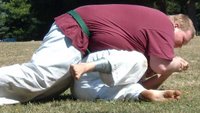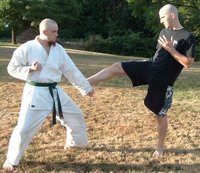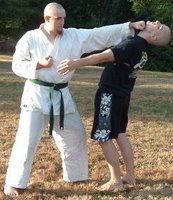Karate: Some broad discussion on OPENING THEORY

Although the subject of opening moves rarely seems to be given the weight it may deserve in most books on martial arts, as with chess, backgammon or go the first movements of a match or fight can decide the outcome. If mixed martial arts tournaments have taught us anything, it is to paraphrase an adage "in like a lion, out like a light." Please feel free to leave a comment about your views on opening and the discussion itself!
The correct practice of forms or kata is essential to effectively act and react in the Spring of a match. Kata, when practiced with vigor and imagination (bunkai ring any bells?), can improve speed, accuracy, mental reaction and proper form. Indeed, kata, when properly adhered to, lays the foundation of attack and defense in an encounter. With that point clarified, the question becomes: how can one refine their practice of forms to genuinely prepare them for a real opponent?
The long road to effective kata
When practicing kata it is essential to keep your eye single to your own development and perfection as a martial artist and not to practice to win trophies or titles. When you have surpassed your weaknesses as a martial artist, those things will come, if you still desire them, because you will have progressed beyond the showman and become the master. This true motivation will put a snap in your kicks, quicken your memory and put a fierce dragon in your kiai. However, heart is not enough, there must also be a plan. A route to tread that will give direction and progression.
First, of course, must come the basics. Like the first stretch of any journey, the basics allow a student to accustom him or herself to what lies ahead. Stances, movement, blocks, punching and other strikes help the burgeoning karateka develop themselves and get a "feel" for the art. As these techniques become familiar, the karate student will begin to learn karate kata.
Next, as the student becomes more accustomed to their particular style, they begin to understand not only about different movements and stances, but also about the distance between them and their opponent. These concepts seem to blossom and bloom as the dust rises and the sweat begins to drop on the martial Way.
Then, the student will find the deeper philosophical and spiritual meanings behind the practice. Concepts of dodging, escaping, forcing, et cetera are all second nature and practicing karate kata or engaging in karate kumite only seem to nourish their souls and teach them more and more. The distance between karate student and opponent seems less and less until both become one.
Finally, the karate-ka will come full circle: from mastering techniques to teaching them. The karate-ka will be aware of their strengths and weaknesses and know how to apply them to their martial encounters. Still, the journey is not over and the trail must be trod again. With each repitition of the cycle, the level of proficiency and dedication of the martial arts student are increased and what once was an unwashed vagrant has now become a pilgrim, a champion of the Way.
For discussion
How does the martial artist's opening sequence develop in each of these phases? What are some effective opening moves and theories?




